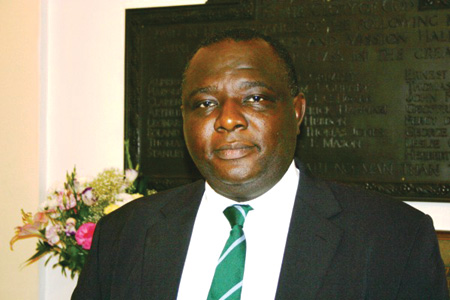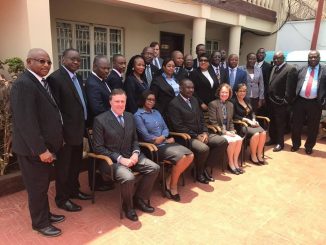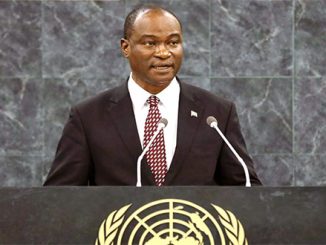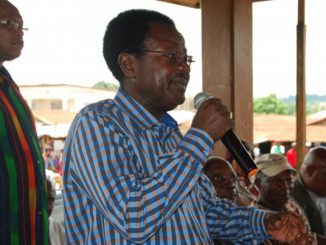
Titus Boye-Thompson Communications Consultant
Every so often, the vexed question on State authority to act and impose law and order diminishes to
an argument over Police brutality, the limitation on rights and freedoms, the imposition of
restrictions on the right to assembly and self-expression, the constraining of artistic forms and the
disposition in relation to political biases.
The containment of potentially volatile situations cannot
but require a strong show of force and the ability of the State to wield its mandate to secure life and
property notwithstanding, the limitations on human activities that could pose a potential threat to
the rest of society is immutable as a reason for strong decisive action than anything else. The lack of
strong will or the hesitancy to act when the need arises all combine to weaken the very fabric of a
law abiding society.
It is against this background that the events surrounding the Independence day
fracas between the Sierra Leone Police and the Sierra Leone Peoples Party should be viewed.
It is interesting to note that it was with an almost crisp clarity that the Head of Media at the Sierra
Leone Police dispelled the emerging innuendos characterized of such incidences by a carefully
worded and sequential analysis of what transpired immediately preceding the events that unfolded
on April 27th. With such clear language as to leave no room for ambiguities, ASP Brima Kamara
shattered the innocuous defence that those who were invariably law breakers had already started to
push out to a gullible public as high handed policing against them motivated by political
considerations.
Nothing is further from the truth and the cause of the imbroglio was squarely laid
where it had to be, at the foot of the SLPP masquerade that failed to seek a police permit through
the recognized agency and not only that but failed to adhere to reasonable timing of a request for
permit in the circumstances, and to the extent that the umbrella group that was to have applied for
a permit on their behalf refused point blank to support their individual application for a license to
undertake what would have been an unregulated procession, illegal under the requisite ordinances
and law of Sierra Leone.
For this piece, the emphasis here is on the execution of a smooth communications machinery that
was effective enough to disquiet what would otherwise have been a volatile situation and to quell a
riot in its infancy. The Police showed remarkable courage under fire, stood their ground and was
able to defend their actions in the face of the wanton recklessness imposed on innocent bystanders,
Government offices and private property in the immediate proximity of their clash with the
masquerade.
It can easily be imagined that much worse would have happened had the attempt to
regain the legal upper hand had been allowed to spread over a wider area of engagement. The swift
action of the Police and security forces saw to it that the impending upsurge of lawlessness was
contained within a relatively small part of town. This was made possible by policing at a community
level, ensuring that the effectiveness of relationships and networks within communities allow for the
smooth functioning of the Police, served by credible intelligence and local needs assessment.
In all, the argument that the style of Policing deployed in the communities of Freetown are effective
cannot be frustrated by such an abrasive attempt to disobey the law but look to an obscure
legitimacy to support that tactic.
The decision to masquerade without a permit was wrong, even as
the party Chairman was saying in effect, what tantamount to an acceptance of guilt by association,
some were still defensive that an opposition party should not be held to the same rules of
accountability as an ordinary ordehlay. What they fail to realize is that those very same rules applied
to lesser mortals are the ones if left or allowed to go unheeded would lead to a greater catastrophe.
There is a simple lesson to be learned from this situation.
Public institutions that serve the public
must first of all established clear and concise procedures for effective service delivery and they
should ensure that they strictly adhere to these rules of engagement. Secondly, institutions should
work through their systems for weaknesses and where possible, work through third parties or
intermediaries so that the responsibility for delivery and feedback is shared.
Finally, the most important lesson is that of effective communications. The clear instructive
communication that was put out by the Sierra Leone Police shamed the SLPP into admitting they had
some blame in what transpired on that fateful day. If the SLP had not put that information out in
such a clear and easy to read manner, had they used Police speak to convey the sentiments that
resonated so well with the general public, had they instead relied on going round to radio and TV
stations only to explain their side of the story, they would have lost the battle for understanding of
their position that they so easily gained this time round. It is significant that recent work with the
Police Media Team is now paying such dividends but the greater good is to the public that was not
so easily led to believe false stories of their Police force.
The confidence that the public regained on
the force by this method of communication cannot be easily measured but what is certain is the fact
that the Police gained a higher profile and they had the evidence to show for that gain. It is a good
day when communication is used so effectively to dispel malicious and false rum



